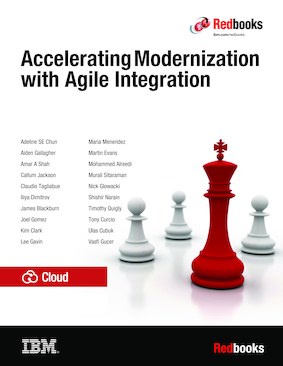
Published on 30 January 2020, updated 02 July 2020
Share this page:
ISBN-10: 0738458368
ISBN-13: 9780738458366
IBM Form #: SG24-8452-00
Authors: SE Adeline Chun, Aiden Gallagher, Amar A Shah, Callum Jackson, Claudio Tagliabue, Iliya Dimitrov, James Blackburn, Joel Gomez, Kim Clark, Lee Gavin, Maria Menendez, Martin Evans, Mohammed Alreedi, Murali Sitaraman, Nick Glowacki, Shishir Narain, Timothy Quigly, Tony Curcio, Ulas Cubuk and Vasfi Gucer
Related video
0
Abstract
The organization pursuing digital transformation must embrace new ways to use and deploy integration technologies, so they can move quickly in a manner appropriate to the goals of multicloud, decentralization, and microservices. The integration layer must transform to allow organizations to move boldly in building new customer experiences, rather than forcing models for architecture and development that pull away from maximizing the organization's productivity.
Many organizations have started embracing agile application techniques, such as microservice architecture, and are now seeing the benefits of that shift. This approach complements and accelerates an enterprise's API strategy. Businesses should also seek to use this approach to modernize their existing integration and messaging infrastructure to achieve more effective ways to manage and operate their integration services in their private or public cloud.
This IBM® Redbooks® publication explores the merits of what we refer to as agile integration; a container-based, decentralized, and microservice-aligned approach for integration solutions that meets the demands of agility, scalability, and resilience required by digital transformation. It also discusses how the IBM Cloud Pak for Integration marks a significant leap forward in integration technology by embracing both a cloud-native approach and container technology to achieve the goals of agile integration.
The target audiences for this book are cloud integration architects, IT specialists, and application developers.
Table of Contents
Chapter 1. Introduction
Chapter 2. Agile integration
Chapter 3. Agile integration: Capability perspectives
Chapter 4. Cloud-native concepts and technology
Chapter 5. IBM Cloud Pak for Integration
Chapter 6. Practical agile integration
Chapter 7. Field notes on modernization for application integration
Chapter 8. Field notes on modernization for API lifecycle
Chapter 9. Field notes on modernization for messaging